Michael J. Behe's Blog, page 567
November 19, 2018
Researcher: Human impact is a “reshaping of the tree of life”

Sara Otto, Zoology, UBC
Sarah Otto, a University of British Columbia researcher, tells media about her research,
Her paper is replete with examples from bird species slowly forgetting to migrate to mosquito breeds adapted specifically to underground subway tunnels.
Backyard bird feeders are behind changes in the beak shape and strength of house finches. Different mammals are becoming nocturnal as a way to avoid human conflict. Introduced species change the ground rules for native plants and animals.
It’s a mistake to think evolution requires millennia, said Otto.
“Evolution happens really fast if the selection regimes are strong. We can see sometimes in plant populations evolutionary change in the course of years.”Bob Weber, “Humans are having huge influence on evolution of species, study says” at CBC
Timely warnings to be sure. Of course, most people don’t think of these types of changes as “evolution”; more like the improved prospects of life forms that feature specific, probably reversible, variations. Something more dramatic and permanent might be needed to reshape the tree of life.
Sometimes, it’s counterintuitive. Poaching favoured the survival of tuskless elephants. Canada geese that no longer migrate have long been a nuisance in eastern Canada’s urban heat islands but what would happen if it turned cold again? Would they just take to the air again? Is there a reason why they couldn’t? But here’s the abstract:
Abstract: Humans have dramatically altered the planet over the course of a century, from the acidity of our oceans to the fragmentation of our landscapes and the temperature of our climate. Species find themselves in novel environments, within communities assembled from never before encountered mixtures of invasives and natives. The speed with which the biotic and abiotic environment of species has changed has already altered the evolutionary trajectory of species, a trend that promises to escalate. In this article, I reflect upon this altered course of evolution. Human activities have reshaped selection pressures, favouring individuals that better survive in our built landscapes, that avoid our hunting and fishing, and that best tolerate the species that we have introduced. Human-altered selection pressures have also modified how organisms live and move through the landscape, and even the nature of reproduction and genome structure. Humans are also shaping selection pressures at the species level, and I discuss how species traits are affecting both extinction and speciation rates in the Anthropocene. (open access) More.
Follow UD News at Twitter!
See also: Devolution: African elephants survive by shedding their tusks (no interest to poachers) The trait (no tusks or else have tiny tusks) was there all along but became an asset when the main foe was attracted to, rather than deterred by, tusks. The double whammy may have meant even more rapid change.
and
John Sanford on claims about brand new nylonase genes
Copyright © 2018 Uncommon Descent . This Feed is for personal non-commercial use only. If you are not reading this material in your news aggregator, the site you are looking at is guilty of copyright infringement UNLESS EXPLICIT PERMISSION OTHERWISE HAS BEEN GIVEN. Please contact legal@uncommondescent.com so we can take legal action immediately.
Plugin by Taragana
Why Darwinian philosopher Michael Ruse is not a new atheist
 This one missed the religion news stream yesterday; just saw it today:
This one missed the religion news stream yesterday; just saw it today:
Partly it is aesthetic. They are so vulgar.
Dawkins in The God Delusion would fail any introductory philosophy or religion course. To take one example, the Ontological Argument for God was first devised by Anselm and refurbished by Descartes. Roughly, it runs thus: God is by definition that than which none greater can be thought. Does He exist? Suppose He doesn’t. Then there is a greater who does exist. Contradiction! Hence, God exists.
In The God Delusion, Richard Dawkins dismisses this longstanding and much debated philosophical argument with a few sneering paragraphs. His critique is on a par with someone arguing against Dawkins’ own body of work by saying that selfish genes cannot exist because genes cannot be selfish (and with about as much understanding or sensitivity). But hardly any serious theologian or philosopher thinks the Ontological Argument is valid in the way I have just described it. It has been reframed and reworked. Every serious theologian and philosopher knows that the argument leads us into important and sophisticated questions about the nature of existence. Does the notion of necessary existence – which must surely be true of God if he exists – even make sense? And so forth. To arrogantly dismiss the argument is bad scholarship and, worse still, bad taste. Ironically, I get on better with many of my Christian interlocutors than I do with many atheists.Michael Ruse, “I’m an atheist. But thank God I’m not a New Atheist” at Premier Christianity
Ruse’s comments followed a debate with Oxford mathematician John Lennox about Science, faith and the evidence for God.
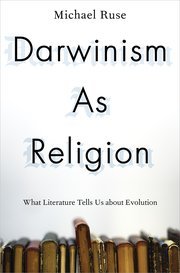 Michael Ruse is the author of Darwinism as Religion (2016) as well as many other works on Darwinism and culture.
Michael Ruse is the author of Darwinism as Religion (2016) as well as many other works on Darwinism and culture.
Follow UD News at Twitter!
See also: Michael Ruse: Christianity and Darwinism as rival religions
and
Museum curator on allowing “a foot in the door” on origins questions
Copyright © 2018 Uncommon Descent . This Feed is for personal non-commercial use only. If you are not reading this material in your news aggregator, the site you are looking at is guilty of copyright infringement UNLESS EXPLICIT PERMISSION OTHERWISE HAS BEEN GIVEN. Please contact legal@uncommondescent.com so we can take legal action immediately.
Plugin by Taragana
November 18, 2018
Yes, the placebo effect is real, and it may be getting stronger
 At Mind Matters: The fact that you may start to get better if you believe you are receiving treatment is one of the best-attested facts in medicine.
At Mind Matters: The fact that you may start to get better if you believe you are receiving treatment is one of the best-attested facts in medicine.
A drug licensed for use must demonstrate greater effectiveness than a placebo (a capsule of sugar or an inert substance, perhaps) in clinical trials. That standard does not mean, as is sometimes supposed, “greater effectiveness than nothing.”
Many conditions for which we seek treatment respond—at least for a time—to the simple belief that we are receiving treatment. The placebo effect, as that fact is called, is one of the best-attested effects in medicine.
But the fact that the mind acts on the body troubles materialists. Such facts, they say, require revision. Good luck with that.
The placebo effect may even be getting stronger, at least in the United States. Greenberg tells us, “A 2015 study published in the journal Pain analyzed 84 clinical trials of pain medication conducted between 1990 and 2013 and found that in some cases the efficacy of placebo had grown sharply, narrowing the gap with the drugs’ effect from 27 percent on average to just 9 percent.” One explanation offered is that more direct marketing to American patients heightens their expectations of the medication and/or the medical rituals by which it is administered. That would spike the placebo effect. More.
Follow UD News at Twitter!
See also: A short argument against the materialist account of the mind (Jay Richards)
Reconciling mind with materialism twenty-five years on Jerry Fodor posits that the reason “we’re all materialists” is the alternatives seem even worse
and
The brain is not a “meat computer” (Michael Egnor)
Copyright © 2018 Uncommon Descent . This Feed is for personal non-commercial use only. If you are not reading this material in your news aggregator, the site you are looking at is guilty of copyright infringement UNLESS EXPLICIT PERMISSION OTHERWISE HAS BEEN GIVEN. Please contact legal@uncommondescent.com so we can take legal action immediately.
Plugin by Taragana
Convergent evolution: Psychology Association says killer whales share personality traits with humans, chimps

killer whales/NOAA
Using a five-factor test. Convergent evolution is cited:
Researchers found that the personality traits of killer whales were similar to those of both humans and chimpanzees but more similar to chimpanzees. Killer whales were similar to chimpanzees and humans for the extraversion factor (e.g., playful, gregarious and sociable). Killer whales and chimpanzees also shared a combination of personality traits for conscientiousness (e.g., constant, stubborn and protective) and agreeableness (e.g., patient, peaceable and not bullying), along with some personality traits relating to dominance.
The findings may suggest some evolutionary convergence where the personality traits of killer whales and primates are similar because of the advanced cognitive abilities required for complex social interactions. “Killer Whales Share Personality Traits with Humans, Chimpanzees” at American Psychological Association
Too bad dogs and horses were not also measured because they would likely show those traits too. This research demonstrates that the qualities that one might expect to find in mammals living in a closely-knit group. But here’s the conundrum: If humans, chimps, and killer whales all show a trait, why study chimpanzees — as is so often done — in order to better understand it in humans? That is, if convergence on a common goal is a reasonable explanation, what specific question is answered by claims of common descent?
Convergent evolution is, of course, a better explanation for similar psychological traits than common descent. Dogs and horses, for example, are drawn to humans; chimps are not. Dogs and horses are not drawn to chimps either. Studying the relationships that do exist, we will likely find that humans can substitute for something dogs and horses seek in their peers and thus supplant the natural relationship. But that is because a similar type of relationship exists, convergently, among humans.
Follow UD News at Twitter!
See also: BBC: Chimpanzees show empathy and altruism just like humans. And politicians can learn from them. Reality: Chimpanzees don’t seek humans out the way dogs do. In many ways, dogs are more like humans than chimpanzees are and better able to communicate with us emotionally. Dogs don’t seek out chimpanzees, come to think of it, though recently, some researchers needed to convince themselves that something like that was happening between monkeys and wolves. (Uh, no.)
and
Evolution appears to converge on goals—but in Darwinian terms, is that possible?
Copyright © 2018 Uncommon Descent . This Feed is for personal non-commercial use only. If you are not reading this material in your news aggregator, the site you are looking at is guilty of copyright infringement UNLESS EXPLICIT PERMISSION OTHERWISE HAS BEEN GIVEN. Please contact legal@uncommondescent.com so we can take legal action immediately.
Plugin by Taragana
Whatta headline! Early man was “total mean girl”
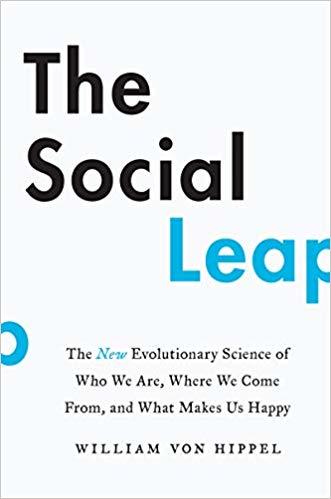 William von Hippel, an evolutionary psychologist promoting a book, explains how we got here:
William von Hippel, an evolutionary psychologist promoting a book, explains how we got here:
Social connection and its middle-school messiness assured our survival — more than harnessing fire or developing opposable thumbs. Von Hippel writes that a series of “social leaps” — or movements forward in the way we connect with our fellow man — made our brains bigger, our connections stronger and our long-term survival certain.
We learn about the importance of bitchiness and gossip.
Our ability to lie and deceive also evolved.
Though many members of the animal kingdom use deception, outright lying requires Theory of Mind, as one needs to comprehend what someone is thinking in order to manipulate them. Evolutionary scientists say this is a distinctly human behavior. Chimps, by contrast, may understand “the goals, intentions, perceptions and internal knowledge states of other individuals,” but are unable “to internalize situations in which other individuals have false beliefs,” writes David Barash in his 2012 book “Homo Mysterious.”
But the emergence of self-deception was the ultimate “social weapon,” von Hippel writes. Susannah Cahalan, “Ancient man survived by being a total mean girl” at New York Post
This is presumably the beauty salon’s addition to the multiplicity of theories around how human intelligence came to exist (provided, of course, you think it does exist and that intelligence tests are not necessarily just plain unfair to apes).
Follow UD News at Twitter!
See also: Brain hacks: The amazing list of reasons why human brains became so complex
Do big brains matter to human intelligence?
Reconciling mind with materialism twenty-five years on
The brain is not a meat computer (Michael Egnor)
and
Is human evolution happening faster than ever? Killer quote: “Realising evolution doesn’t only happen by natural selection makes it clear the process isn’t likely to ever stop.” If humans evolve to meet the demands of our environment, as the prof says, how will that affect the a-crock-a-lypse market in assorted doomsdays? (And, for that matter, assorted explanations?)
Copyright © 2018 Uncommon Descent . This Feed is for personal non-commercial use only. If you are not reading this material in your news aggregator, the site you are looking at is guilty of copyright infringement UNLESS EXPLICIT PERMISSION OTHERWISE HAS BEEN GIVEN. Please contact legal@uncommondescent.com so we can take legal action immediately.
Plugin by Taragana
Is human evolution happening faster than ever?
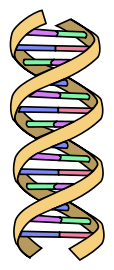 Killer quote: “Realising evolution doesn’t only happen by natural selection makes it clear the process isn’t likely to ever stop.” So says an evolutionary geneticist:
Killer quote: “Realising evolution doesn’t only happen by natural selection makes it clear the process isn’t likely to ever stop.” So says an evolutionary geneticist:
We measure the speed of gene evolution by comparing human DNA with that of other species, which also allows us to determine which genes are fast-evolving in humans alone. One fast-evolving gene is human accelerated region 1 (HAR1), which is needed during brain development. A random section of human DNA is on average more than 98% identical to the chimp comparator, but HAR1 is so fast evolving that it’s only around 85% similar.
Though scientists can see these changes are happening – and how quickly – we still don’t fully understand why fast evolution happens to some genes but not others. Originally thought to be the result of natural selection exclusively, we now know this isn’t always true.
Recently attention has focused on the process of biased gene conversion, which occurs when our DNA is passed on via our sperm and eggs. Making these sex cells involves breaking DNA molecules, recombining them, then repairing the break. However, molecular repairs tend to happen in a biased manner.Laurence D. Hurst, “Human evolution is still happening – possibly faster than ever” at The Conversation
If humans evolve to meet the demands of our environment, as the prof says, how will that affect the a-crock-a-lypse market in assorted doomsdays?
Follow UD News at Twitter!
See also: No one evolved faster than the Neanderthal Look how smart he got in the last few decades (if you go by a discussion of Neanderthals and language)
Copyright © 2018 Uncommon Descent . This Feed is for personal non-commercial use only. If you are not reading this material in your news aggregator, the site you are looking at is guilty of copyright infringement UNLESS EXPLICIT PERMISSION OTHERWISE HAS BEEN GIVEN. Please contact legal@uncommondescent.com so we can take legal action immediately.
Plugin by Taragana
Does time exist and do we experience it?
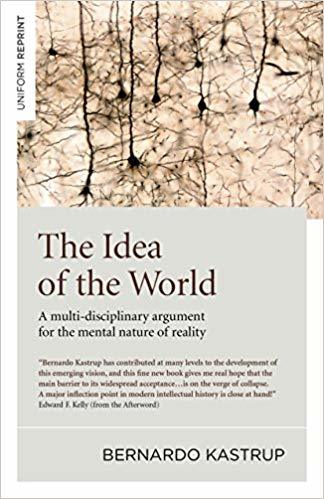 That’s a perhaps surprisingly contentious topic among theoretical physicists:
That’s a perhaps surprisingly contentious topic among theoretical physicists:
You see, whether time flows forward, or doesn’t flow at all, or moves back and forth, our resulting subjective experience would be identical in all cases: we would always find ourselves in an experiential snapshot extending smoothly backwards in memory and forwards in expectation, just like the desert road. We would always tell ourselves the same story about what’s going on. A mere cognitive narrative—based purely on contents of the experiential snapshot in question—would suffice to convince us of the forward flow of time even when such is not the case.
The ostensible experience of temporal flow is thus an illusion.Bernardo Kastrup, “Do we actually experience the flow of time?” at Scientific American
Bernardo Kastrup has a book coming out on this, The Flow of the World.
But isn’t consciousness itself an evolved illusion, according to Darwinians?
Follow UD News at Twitter!
See also: You are conscious but so is your coffee mug Materialists have a solution to the problem of consciousness, and it may startle you
and
From Scientific American: “we may all be alters—dissociated personalities— of universal consciousness.”
Copyright © 2018 Uncommon Descent . This Feed is for personal non-commercial use only. If you are not reading this material in your news aggregator, the site you are looking at is guilty of copyright infringement UNLESS EXPLICIT PERMISSION OTHERWISE HAS BEEN GIVEN. Please contact legal@uncommondescent.com so we can take legal action immediately.
Plugin by Taragana
November 17, 2018
Jonathan McLatchie and Gunter Bechly on conflicting evidence re common ancestry
See also: Paleontologist Gunter Bechly live tonight on what the fossil record really tells us about common ancestry
Copyright © 2018 Uncommon Descent . This Feed is for personal non-commercial use only. If you are not reading this material in your news aggregator, the site you are looking at is guilty of copyright infringement UNLESS EXPLICIT PERMISSION OTHERWISE HAS BEEN GIVEN. Please contact legal@uncommondescent.com so we can take legal action immediately.
Plugin by Taragana
The term “mechanome” is catching on, but slowly
At her blog, Suzan Mazur interviews neuroscientist Medha Pathak on the recent Mechanome in Action symposium she chaired at UC-Irvine. Pathak “is currently a professor of physiology and biophysics at UCI and heads the Pathak Lab’s investigation there into “how mechanical forces modulate neural stem cell fate in development and repair.”
Suzan Mazur: If you google “mechanome,” you don’t see that many references to it.
Medha Pathak: The term is catching on. The first Mechbio conference, organized by colleagues Padmini Rangamani, Juan Carlos del Alamo and Debanjan Mukherjee in 2016 at UC-San Diego, was called “Putting Together the Cell Mechanome: Finding the pieces, building the puzzle.”
When organizing the 2018 conference, the second one in the series, we—Jun Allard, Albert Siryaporn, Timothy Downing and I—wanted to go beyond putting the components together to function and decided to call the meeting: “The Mechanome In Action.” Suzan Mazur, “
Neuroscientist Medha Pathak and the “Mechanome in Action”” at Oscillations
It’s true about Googling the term. There is, however, a hashtag now.
Suzan Mazur is the author of The Paradigm Shifters: Overthrowing ‘the Hegemony of the Culture of Darwin’. 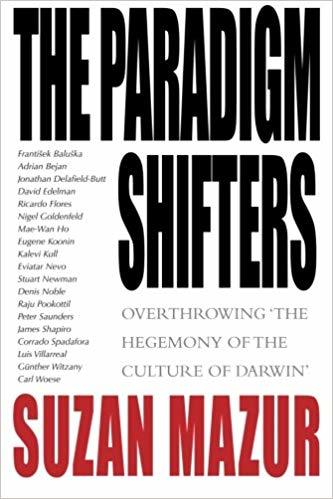
See also: Suzan Mazur asks: How far have we gotten in understanding the mechanome?
Rethinking biology: What role does physical structure play in the development of cells?
and
Suzan Mazur on mechanobiology, the next level of understanding of the cell
Copyright © 2018 Uncommon Descent . This Feed is for personal non-commercial use only. If you are not reading this material in your news aggregator, the site you are looking at is guilty of copyright infringement UNLESS EXPLICIT PERMISSION OTHERWISE HAS BEEN GIVEN. Please contact legal@uncommondescent.com so we can take legal action immediately.
Plugin by Taragana
Devolution: African elephants survive by shedding their tusks
A classic in devolution, actually. In Mozambique, it is estimated that 90% of the elephants have been slaughtered for ivory to finance a civil war that ended in 1992. But tuskless elephants seem more likely to survive:
Hunting gave elephants that didn’t grow tusks a biological advantage in Gorongosa. Recent figures suggest that about a third of younger females—the generation born after the war ended in 1992—never developed tusks. Normally, tusklessness would occur only in about 2 to 4 percent of female African elephants.
Decades ago, some 4,000 elephants lived in Gorongosa, says Joyce Poole—an elephant behavior expert and National Geographic Explorer who studies the park’s pachyderms. But those numbers dwindled to triple digits following the civil war. New, as yet unpublished, research she’s compiled indicates that of the 200 known adult females, 51 percent of those that survived the war—animals 25 years or older—are tuskless. And 32 percent of the female elephants born since the war are tuskless.Dina Fine Maron, “Under poaching pressure, elephants are evolving to lose their tusks” at National Geographic
The trait (no tusks or else have tiny tusks) was there all along but became an asset when the main foe was attracted to, rather than deterred by, tusks. The double whammy may have meant even more rapid change.
In other news, this has certainly been “Devolution Week” at Uncommon Descent, if we go by some of the other stories, linked below. Everything seems to be devolving except our numbers of readers, which spiked recently. Yay, readers! Keep coming back!
Seriously, devolution is a bit like extinction; it’s under-considered as a source of evolution, probably because it doesn’t fit the expected and sought-after pattern. One problem is, we then don’t get a clear picture of what is happening. News
What if simplification is a common way life forms evolve? Would we want to know that or not?
Follow UD News at Twitter!
See also: John Sanford on claims about brand new nylonase genes
John Sanford gives lecture at NIH on mutations and human health
A peek at Mike Behe’s new book Darwin Devolves We’re told that the basic thesis is, The First Rule of Adaptive Evolution: Break or blunt any functional gene whose loss would increase the number of offspring.
Huge study shows yeasts evolve by reducing their complexity If losing complex traits is a reliable and successful form of evolution, how did successful life forms acquire great complexity in the past, when there was less time to evolve?
and
Devolution: Getting back to the simple life (an overview)
Copyright © 2018 Uncommon Descent . This Feed is for personal non-commercial use only. If you are not reading this material in your news aggregator, the site you are looking at is guilty of copyright infringement UNLESS EXPLICIT PERMISSION OTHERWISE HAS BEEN GIVEN. Please contact legal@uncommondescent.com so we can take legal action immediately.
Plugin by Taragana
Michael J. Behe's Blog
- Michael J. Behe's profile
- 219 followers



